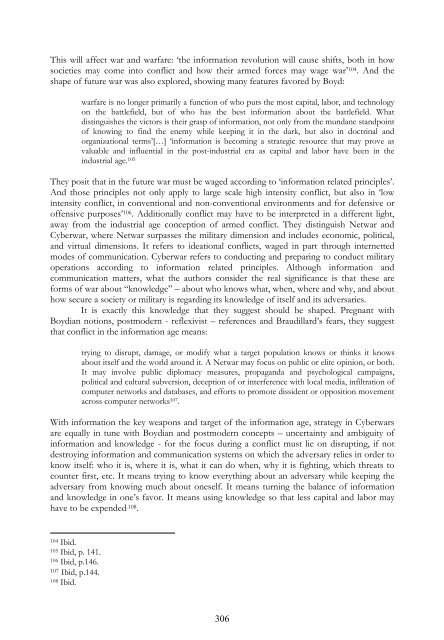Science, Strategy and War The Strategic Theory of ... - Boekje Pienter
Science, Strategy and War The Strategic Theory of ... - Boekje Pienter
Science, Strategy and War The Strategic Theory of ... - Boekje Pienter
Create successful ePaper yourself
Turn your PDF publications into a flip-book with our unique Google optimized e-Paper software.
This will affect war <strong>and</strong> warfare: ‘the information revolution will cause shifts, both in howsocieties may come into conflict <strong>and</strong> how their armed forces may wage war’ 104 . And theshape <strong>of</strong> future war was also explored, showing many features favored by Boyd:warfare is no longer primarily a function <strong>of</strong> who puts the most capital, labor, <strong>and</strong> technologyon the battlefield, but <strong>of</strong> who has the best information about the battlefield. Whatdistinguishes the victors is their grasp <strong>of</strong> information, not only from the mundane st<strong>and</strong>point<strong>of</strong> knowing to find the enemy while keeping it in the dark, but also in doctrinal <strong>and</strong>organizational terms’[…] ‘information is becoming a strategic resource that may prove asvaluable <strong>and</strong> influential in the post-industrial era as capital <strong>and</strong> labor have been in theindustrial age. 105<strong>The</strong>y posit that in the future war must be waged according to ‘information related principles’.And those principles not only apply to large scale high intensity conflict, but also in ‘lowintensity conflict, in conventional <strong>and</strong> non-conventional environments <strong>and</strong> for defensive or<strong>of</strong>fensive purposes’ 106 . Additionally conflict may have to be interpreted in a different light,away from the industrial age conception <strong>of</strong> armed conflict. <strong>The</strong>y distinguish Netwar <strong>and</strong>Cyberwar, where Netwar surpasses the military dimension <strong>and</strong> includes economic, political,<strong>and</strong> virtual dimensions. It refers to ideational conflicts, waged in part through internettedmodes <strong>of</strong> communication. Cyberwar refers to conducting <strong>and</strong> preparing to conduct militaryoperations according to information related principles. Although information <strong>and</strong>communication matters, what the authors consider the real significance is that these areforms <strong>of</strong> war about “knowledge” – about who knows what, when, where <strong>and</strong> why, <strong>and</strong> abouthow secure a society or military is regarding its knowledge <strong>of</strong> itself <strong>and</strong> its adversaries.It is exactly this knowledge that they suggest should be shaped. Pregnant withBoydian notions, postmodern - reflexivist – references <strong>and</strong> Braudillard’s fears, they suggestthat conflict in the information age means:trying to disrupt, damage, or modify what a target population knows or thinks it knowsabout itself <strong>and</strong> the world around it. A Netwar may focus on public or elite opinion, or both.It may involve public diplomacy measures, propag<strong>and</strong>a <strong>and</strong> psychological campaigns,political <strong>and</strong> cultural subversion, deception <strong>of</strong> or interference with local media, infiltration <strong>of</strong>computer networks <strong>and</strong> databases, <strong>and</strong> efforts to promote dissident or opposition movementacross computer networks 107 .With information the key weapons <strong>and</strong> target <strong>of</strong> the information age, strategy in Cyberwarsare equally in tune with Boydian <strong>and</strong> postmodern concepts – uncertainty <strong>and</strong> ambiguity <strong>of</strong>information <strong>and</strong> knowledge - for the focus during a conflict must lie on disrupting, if notdestroying information <strong>and</strong> communication systems on which the adversary relies in order toknow itself: who it is, where it is, what it can do when, why it is fighting, which threats tocounter first, etc. It means trying to know everything about an adversary while keeping theadversary from knowing much about oneself. It means turning the balance <strong>of</strong> information<strong>and</strong> knowledge in one’s favor. It means using knowledge so that less capital <strong>and</strong> labor mayhave to be expended .108 .104 Ibid.105 Ibid, p. 141.106 Ibid, p.146.107 Ibid, p.144.108 Ibid.306
















